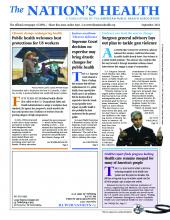
Histories that chronicle public health’s many achievements have long celebrated the monumental milestones that have improved the health of individuals and communities. New pages are added with each achievement.
But the Council on Education for Public Health has likely earned an entire chapter of its own for its work to assure quality in public health education and training by advancing the science and practice of public health.
CEPH was established 50 years ago through a joint effort led by APHA and the Association of Schools of Public Health, which is now known as the Association of Schools and Programs of Public Health. As an independent agency, CEPH is the only organization recognized by the U.S. Department of Education to accredit schools of public health, public health programs and stand-alone baccalaureate programs.
CEPH accreditation serves multiple purposes, its leaders say. For students, the designation provides assurance that a school or program has been evaluated and meets accepted standards established by and with the profession. Prospective employers look to CEPH for assurance that the curriculum covers the essential skills and knowledge needed for today’s jobs. Graduates see CEPH accreditation as a path to greater employment opportunities, especially positions that base eligibility upon graduation from an accredited school or program.
“CEPH accreditation is the gold standard,” said Sharonda Wallace, PhD, MPH, RDN, president of CEPH’s board of councilors and dean of the master of public health program at Chamberlain University in Chicago. “It ensures the quality of the education of the public health program.”
Having led Chamberlain University’s journey to CEPH accreditation, Wallace knows first-hand the rigors of the process and the value that the CEPH designation holds for students, employers and the community.
“Students are smart consumers,” Wallace told The Nation’s Health. “They understand what it takes for an institution or a program to become accredited.”
But the process does not stop there, Wallace said, noting that CEPH-accredited units must seek reaccreditation every five to seven years because “students want to know that they’re getting the most current and relevant information in public health that’s out there.”

Generations of public health students have benefited from accreditation of schools and programs through CEPH.
Photo by SDI Productions, courtesy iStockphoto
In its first year as an independent organization, CEPH accredited 10 schools of public health. Today, 256 educational bodies boast accreditation through the organization.
Some types of employment are only open to graduates of CEPH-accredited entities, said CEPH Executive Director Laura Rasar King, EdD, MPH, such as with the U.S. Public Health Service. Other employers may express a preference for graduates of CEPH-accredited units.

CEPH representatives conduct a site visit at the University of Missouri’s College of Health Sciences in Columbia this year. The university’s BS and MPH programs are accredited by CEPH.
Photo courtesy CEPH
CEPH also marked a milestone in 2014 when it accredited the first group of stand-alone public health baccalaureate programs. Previously, there had been no mechanism to accredit programs that existed only as undergraduate programs. With that move, CEPH-accreditation now runs the spectrum from bachelor’s to doctoral schools and programs.
CEPH’s 50th anniversary will be spotlighted at APHA’s 2024 Annual Meeting and Expo in Minneapolis in October. Events will kick off on Saturday, Oct. 26, with an all-day forum highlighting good practices and helpful strategies in public health education.
The forum will feature 12 sessions with three presenters per session, said Williams, noting that the submissions drove the agenda. Topics to be covered include crafting competencies, preparing for accreditation, engaging online students and building community online. One session will focus on free apps that can make pursuing accreditation easier. Registration for the forum is now open on CEPH’s website and will remain open until the event is full. On Saturday following the forum, CEPH will host an appreciation reception to honor its many volunteers, including past counselors, site visitors and organizational partners such as APHA and ASPPH.
APHA played an important role in CEPH’s development. In fact, from 1946 to 1974, APHA served as the accrediting body for schools of public health. But organizational changes led APHA to divest itself of its accrediting responsibilities.
With that decision, APHA and ASPPH — then known as ASPH — sponsored a task force to study what to do about accreditation. The outcome included a recommendation to spin off a separate accrediting organization for schools of public health. In 1974, APHA and ASPH incorporated CEPH as an independent accrediting body.
“The volunteer reception will be a nice opportunity to thank and honor our volunteers,” said Nicole Williams, MPH, CEPH’s director of accreditation operations. “We can’t do our accreditation work without our volunteer corps.”
For more information and to register for the forum, visit www.ceph.org.
- Copyright The Nation’s Health, American Public Health Association









